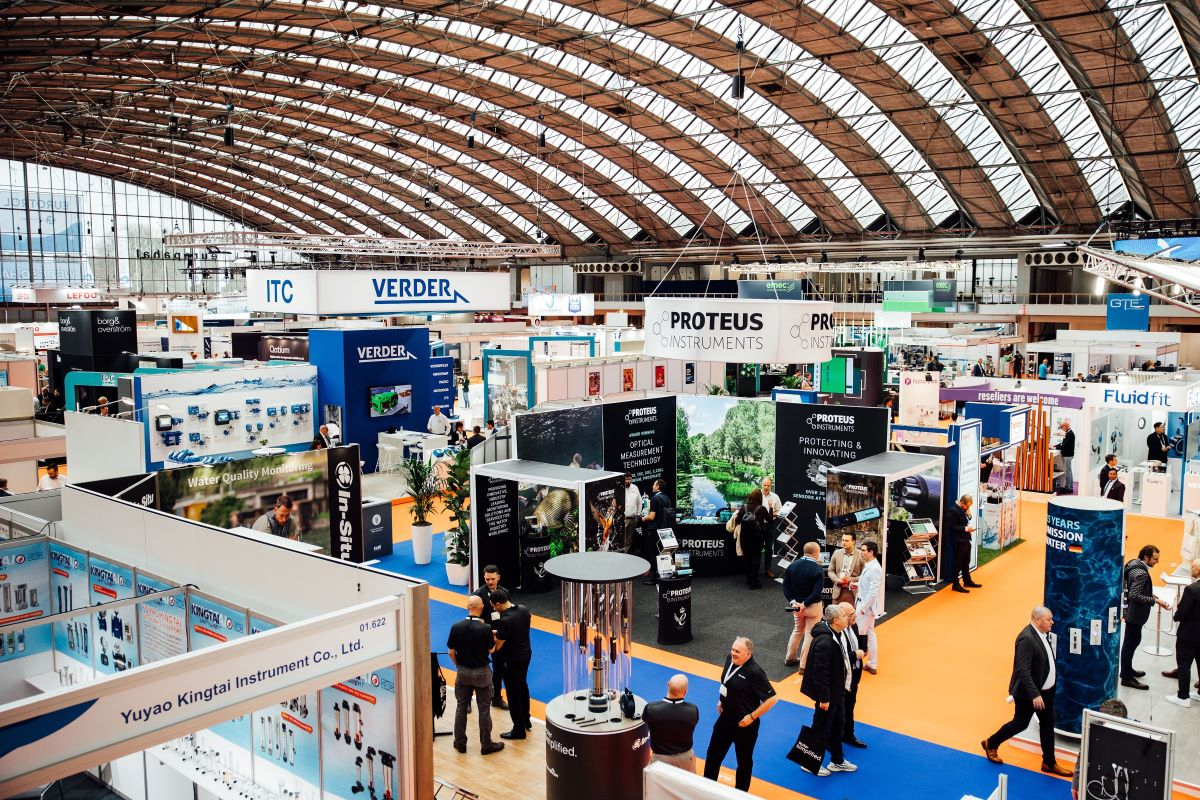This article is also available in Italian / Questo articolo è disponibile anche in italiano
Amsterdam – In early March, water and technology took centre stage as Aquatech 2025 transformed the RAI convention centre into a large international laboratory capable of bringing together more than 25,500 professionals from 136 countries. A journey through global solutions and challenges: artificial intelligence, wastewater treatment, the fight against PFAS, water reuse, and advancements in drinking water systems. As many as 889 exhibitors showcased, project by project, how the industrial management of an increasingly precious resource is evolving. The figures speak for themselves: according to estimates from Mordor Intelligence, the water and wastewater treatment technology market—valued at 65.15 billion dollars in 2025—aims to reach 87.18 billion dollars over the next five years.
Yet one key question remains: what challenges and opportunities lie ahead for the sector? Renewable Matter explored this with Gerben Hardeman, Exhibition Director of Aquatech Amsterdam.
Hardeman, one of the standout moments this week was the recognition of Aurea with the Innovation Award—a groundbreaking innovation by Royal HaskoningDHV, designed to sustainably remove micro-pollutants from wastewater. What other key trends or technologies have emerged this year?
In terms of innovation, we saw a lot on PFAS and their removal. Circular water management is also an important topic at the moment. We are seeing AI enabling smart water networks, which has been a major highlight. Another emerging trend is about becoming water-positive—meaning industries should take responsibility for their water footprint and return more water than they consume.
Water positive is also connected to desalination, right?
Yes, absolutely. It is an expanding sector, particularly with an emphasis on achieving energy efficiency, supported by solar power and similar solutions to reduce environmental impact. There are developments across different areas, including wastewater treatment, aimed at returning water to the natural environment.
With increasing regulatory pressure and the urgency of climate adaptation, how is the water industry responding in terms of investment and collaboration?
At Aquatech many impact investors were looking for partnerships with future-proof technologies, usually linked to sustainability and innovation, to tackle the global water challenges we are going to face in the coming years. Both the public and private sectors have set targets for 2030. However, I still feel we might be underestimating the scale of the global water challenges ahead. For example, in the Netherlands, sometimes we believe that technology alone will be enough. But I think the approach needs to be much broader than that. The longer we delay investments, the more it will cost.
Aquatech 2025 in Amsterdam came to an end, but the journey continues in China and Mexico, where two regional editions are taking place. How does Aquatech adapt its approach in different parts of the world?
Aquatech Amsterdam is a global platform for addressing water-related challenges. When we expand to regions like Mexico or China, we identify specific priorities for each market. While the core concept of Aquatech remains the same, the approach is adapted to regional needs. Mexico and China share challenges such as water pollution, overabundance, and scarcity—the same global issues we tackle at Aquatech. However, solutions must be adapted to local needs. In Mexico, for instance, water leakage is a significant concern that must be tackled as a priority. It is important to tackle basic issues like leaks before advancing to technologies like AI. It is about finding the right solution for the local context and building from there.
The Netherlands has a strong reputation for water management and innovation. How is the country strengthening its position as a leader in the global water sector, and what lessons can others take from its approach?
We have a strong reputation in water management, particularly regarding clean water, and I think you are absolutely right. Collaboration is in our DNA—whether between the public and private sectors, research and development, startups, or beyond. It is not always easy, but it is something we are fully committed to. That said, I also believe there is much to learn from others and from different sectors. My view is that it is not just about technological solutions—despite our focus at Aquatech—but about integrating nature-based solutions as well. Given that we are a small, densely populated country, this is also linked to urban planning. How can we make agriculture more future-proof? How can we influence consumption patterns, not just in industry but also among consumers? There is still much to be done on our end, but we have a strong foundation to build on, such as our Water Campus, where startups, researchers, schools, and other institutions collaborate to tackle the challenges we face in the Netherlands. I believe that is our greatest advantage, particularly given our country’s size.
In an era of rising trade barriers and tariffs, how is the water technology industry navigating these challenges?
There is a lot of unrest in the world right now, but at the same time, I see a growing awareness of the need for collaboration. Even if you are a big company, you still need to collaborate with multiple stakeholders. The multi-stakeholder approach is essential, and collaboration remains key. That is why events like Aquatech and knowledge-sharing platforms are so valuable. We had challenges with twenty-four roundtables, each focusing on different issues, where people from various perspectives came together. When you bring them all to the table, you get the most creative ideas to overcome barriers. I am a positive person, and I believe that as long as everyone recognises the need for collaboration and we bring together all these fresh, brilliant ideas, we can have a real impact on the planet and the environment.
Regarding digitalization and AI, we saw many panels and corporations at the forefront of water management. How do you see these technologies shaping the sector’s future, and what challenges do you anticipate in their adoption?
Well, it is not easy, but AI and digitalization can certainly bring a lot of benefits. We can detect leakages much more easily without having to break open the infrastructure. We can use video technology to pinpoint where the leak starts. AI also plays a huge role in predictive maintenance and real-time water quality monitoring, which helps optimise resource use, reduce costs, and improve resilience against climate impacts. However, there are challenges ahead, especially with older computer systems and issues like data security. In Europe, we have strong regulations in place, so that will be a real challenge. I am not sure what the situation in Italy is, but in the Netherlands, and from what I have heard in other international communities, there is a strong need for skilled professionals. As digitalization advances, we need more ICT experts and people to develop these technologies. It is a challenge across different sectors.
Is it a message to the younger generation?
The water sector is an incredible field to work in, but we need to make it more attractive to young people. They are eager to contribute to society and build a more sustainable future, and water is closely linked to many of the Sustainable Development Goals. If we communicate the urgency and the role they can play in solving these issues, I am confident that young professionals will be drawn to the water sector. We need them, especially because many communities around the world still lack access to clean water. If we present this as an opportunity to make a real global impact, I believe the younger generation will be eager to join us.
Cover: Aquatech



